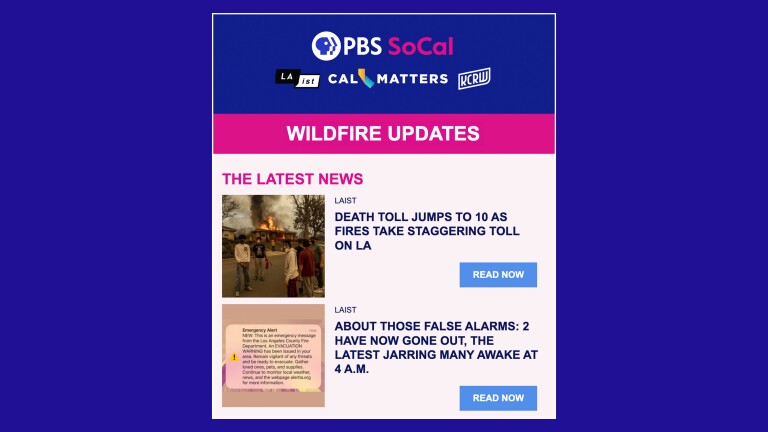These Devastating Fires are Taking a Toll On Our Mental Health. Here’s How to Know When to Seek Help

This article was originally published on Jan 10, 2025 on laist.com.
As deadly fires ravage the L.A. region, experts say symptoms of distress like nightmares, flashbacks, nausea and difficulty sleeping can actually be normal responses to have right now.
But there’s also something called the “dose of exposure”: Did you have a traumatic evacuation experience? Were you fearful for your life or for your family?
Merritt Schreiber, a clinical child psychologist at UCLA, said those can be indicators that it’s time to seek help.
“Of course it’s completely understandable to be very, very scared and frightened. But it’s when that elevates itself to almost paralyzing fear, that can be an indicator that you might seek additional services,” said Schreiber, who is also the chair of Disaster Response for the California Psychological Association.
As wildfires impact our communities, your trusted public media organizations have come together to deliver free, reliable, and essential news and updates.

If symptoms of distress last more than a few weeks, it’s better to seek help sooner than later, Schreiber added.
If you weren’t evacuated but are still dealing with the grief and fear of having fires blazing all over our region, experts say it’s a good idea to stop doom scrolling and limit your media intake.
“When you are exposed to continuous images of distress and destruction and planes and home loss over and over and over again, that can be a hazard to your own mental health,” Schreiber said.
Jaz Robbins, a licensed psychologist and president-elect of the Los Angeles Psychological Association, said in an overwhelming situation like this, it’s important for Angelenos to give themselves some grace and understand that they will be experiencing a wide range of emotions.
Robbins said the conditions of isolation due to the fires feel eerily similar to the lockdowns during the COVID-19 pandemic. She urged people to reach out to community far and wide to feel less isolated.
“This is unprecedented, absolutely unprecedented, for Los Angeles,” Robbins said. “I think it’s important for folks to allow themselves to experience the full breadth of emotions that they may be experiencing at this time. Expression and relief and release always feed healing... emotional suppression will only feed trauma."
Mental health resources geared toward the fire disaster
The National Disaster Distress Helpline:
Call or text (800) 985-5990.
From the Substance Abuse and Mental Health Services Administration (SAMHSA): “Counselors are available 24/7 to respond to people who need crisis counseling after experiencing a traumatic event or a disaster. Counselors are trained to offer support to people who may be experiencing a range of symptoms.”
The L.A. County Department of Mental Health has support and resources available though its help line: (800) 854-7771
The Department of Mental Health also has a list of disaster mental health resources.
How to talk to children about wildfires, evacuations and losing a home
L.A. Unified School District:
Los Angeles Unified students and families in need of mental health support are encouraged to call the Student and Family Wellness Resource Line at (213) 241-3840. Support is currently available between 7 a.m. and 6 p.m., Monday through Friday.
The National Child Traumatic Stress Network has tips and resources to help children and families cope with the impacts of wildfires:
- Parent Guidelines for Helping Children Impacted by Wildfires (En Español)
- Wildfires: Tips for Parents on Media Coverage (En Español)
- Simple Activities for Children and Adolescents
- Trinka and Sam: The Big Fire - E-book for young children (En Español)
- Helping Youth After a Community Trauma: Tips for Educators (En Español)
- Talking to Children: When Scary Things Happen (En Español)
- Nicole Arzt, a Long Beach-based therapist, is also compiling a list of providers offering pro bono therapy.
- The American Psychological Association has a guide to recovering from wildfires.
- AirTalk segment: How to process the grief and trauma during a natural disaster


